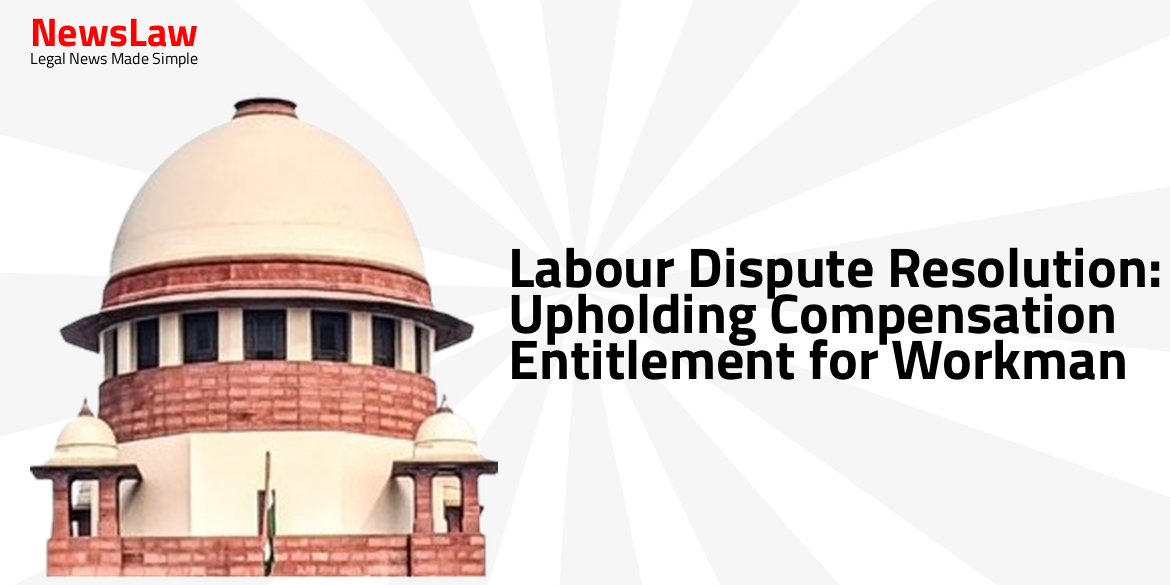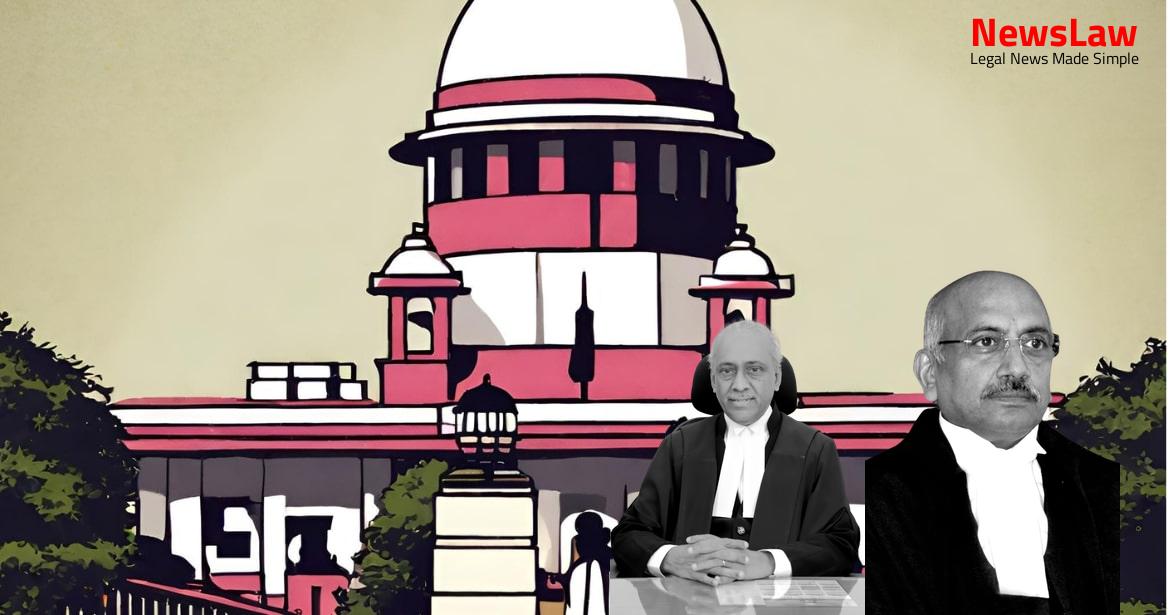In a recent judgment by the Delhi High Court, the entitlement to compensation for a workman in a labour dispute resolution case was upheld. The court carefully examined the rights of the workman in the workplace, ensuring fair treatment and proper compensation. This ruling sets an important precedent for labour disputes in the region, emphasizing the protection of workman rights and fair resolution of workplace conflicts.
Facts
- The Labour Court failed to appreciate that the workman has been consistently receiving the salary prescribed for unskilled work and never raised any objection during his employment.
- The judgment of the Industrial Tribunal did not provide a ‘skilled’ designation as per the scheduled employment for the workman in the plastic, rubber, and PVC industry.
- The workman was designated as a ‘packer’, which falls under the category of ‘unskilled’ workers as per the minimum rates of wages notified.
- The workman did not challenge the Industrial Tribunal’s decision regarding his ‘unskilled’ status and continued to accept the salary for unskilled work.
- The Labour Court failed to consider the fact that there was no urgency from either party to seek a stay on the implementation of the impugned award in the designation matter.
- The judgments cited by the Labour Court were not applicable to the present case, as they had different factual contexts.
- The workman remained consistent in his role and salary as an unskilled worker throughout his employment.
- The Labour Court decided in favor of the respondent workman and against the petitioner entity.
- The respondent workman was entitled to a lump-sum compensation of Rs.200,000/- to be paid by the management within one month of the award publication.
- If the payment is delayed, the management would be liable to pay 9% interest per annum until realization.
- Reinstatement was not an option due to the management’s imminent closure, so the workman was entitled to wages of the skilled/semi-skilled category.
- Retrenchment compensation was deemed inadequate and illegal due to various factors including the delayed retrenchment, as observed by the Hon’ble Justice Mr. S.N. Aggarwal.
- The management calculated retrenchment compensation based on the last drawn salary, not the wages of skilled and semi-skilled workers as ordered by POIT in 2009.
Issue
- The issue before the court is whether the stayed award of the Industrial Tribunal could be relied upon by the Labour Court to determine entitlement to compensation.
- The workman in question was receiving the salary of an ‘unskilled’ laborer throughout his employment, including until the time of retrenchment.
- The court has framed two specific issues for consideration: 1) Whether the termination and retrenchment of the workman were in violation of Section 25F of the Act, and 2) Whether the Industrial Tribunal’s stayed award can be used to support the entitlement to compensation.
- The court will evaluate whether the decision of the Labour Court warrants interference under Article 226 of the Indian Constitution.
Arguments
- The award dated 29 September, 2009 was stayed by the Court in W.P (C) no. 3014/2010 in November 2013.
- The petitioner management argues that even if there was a discrepancy in designation, the worker should be paid the lesser amount due to him.
- The stay order from September 2013 in W.P.(C) 4773/2019 & 21 other connected matters was in effect during the passing of the impugned award.
- The management pleaded for the matter to be decided after the designation issue is resolved in the writ petition.
- The workman’s long service of 16 years was emphasized for the purpose of computing retrenchment compensation and other benefits.
- The management failed to show any illegality or perversity in the 2017 awards by the Labour Court.
- The compensation in the impugned award was based on the designation decided in the 2009 award.
- The workman was retrenched illegally while the 2009 award was in operation.
- The petition by the management is considered devoid of merit and is resisted by the workman.
- The workman’s long period of service and the unjust actions of the management are highlighted in opposition to the petition.
- The Industrial Tribunal’s findings on transfer orders being illegal are mentioned, indicating unfair labour practices by the management.
- Ld. ARM argued that designating the claimant has been stayed by correctly calculating retrenchment compensation and notice pay based on their last drawn wages, not as per the award dated 29.09.2009.
- The claimant filed a case against their transfer and it was determined by POIT that they were performing unskilled work.
- The award resulting from the case was not contested by the claimant before any forum, making it final and operating as res-judicata.
Analysis
- The analysis of the judgment focuses on the violation of Section 25F of the Act by the management.
- The management failed to calculate notice pay and retrenchment compensation as per the 2009 award, which designated the worker as skilled/semi-skilled.
- The evidence presented by the management, including attendance records and seniority lists, did not support their case that the worker had become surplus at the time of retrenchment.
- The court correctly awarded compensation based on the designation provided in the 2009 award, even though it was stayed later in 2013.
- The petitioner’s argument that the compensation should not be based on the stayed award was rejected by the court.
- The court also highlighted the importance of considering the entire factual scenario and legal provisions in passing the impugned award.
- The relations between the parties had deteriorated irreparably, leading to the retrenchment dispute.
- Section 144 CPC allows for variation, reversal, setting aside of interim orders merged into final decision
- Successful party at final stage entitled for restitution to restore to original position
- Principle of restitution upheld in various cases like Nava Bharat Ferro Alloys Limited v. Transmission Corporation of Andhra Pradesh Limited
- Interest for stayed period payable upon dismissal of writ petition as per State of Rajasthan v. J.K. Synthetics Limited
- Imposition stayed during proceedings renders duties to restore parties as per law
- In the current case, respondent workman designation upheld upon dismissal of writ petition
- Duty of the court to restore parties to pre-stayed ruling position
- Financial difficulties of petitioner not an excuse for non-payment of compensation as per Section 25-FFF of the Act
- Legal principles from previous cases like Shree Chamundi Mopeds Ltd applied for reinstating workmen rights
- Court must ensure parties are in the same position post-dismissal of substantive proceedings
- Effect of stay on adjudication clarified in Shree Chamundi Mopeds Ltd v. Church of South India Trust Assn.
- Stayed rulings do not take effect upon dismissal of writ petitions
- Section 25-F of the Act outlines conditions for retrenchment of a workman.
- Employer must give one month’s notice or pay wages in lieu of notice.
- Compensation equivalent to fifteen days average pay for every completed year of continuous service is mandatory.
- Notice to appropriate government is required for a valid claim for compensation.
- Workman must have been in continuous service for at least one year with the employer.
- In the instant batch of petitions, the court found no merit and upheld the findings of the Labour Court.
- The petitioners failed to present any arguments supporting their case in this batch of petitions.
- The Labour Court, in multiple writ petitions, concluded that the workmen were illegally retrenched by the management without proper compensation based on their designations.
Decision
- The issue before the Labour Court was regarding the legality and justification of the workman’s retrenchment.
- The management is directed to pay Rs.2,00,000 to the workman within one month from the date of the award.
- If payment is delayed, interest at the rate of 9% per annum will be applicable.
- Each party will bear their own costs.
- The award is to be sent to the Govt. of NCT of Delhi for publication.
- The file is to be consigned to the record room.
- The petitions have been dismissed with the direction for the management to pay compensation to the workmen within three months.
- The judgment is to be uploaded on the website.
- The impugned award in the connected petitions is upheld by the Court.
- Any pending applications are dismissed.
- The decision of the Labour Court is upheld by the Court.
Case Title: SAWHNEY RUBBER INDUSTRIES Vs. SH. JEET BAHADUR (2024:DHC:4569)
Case Number: W.P.(C)-7966/2020



